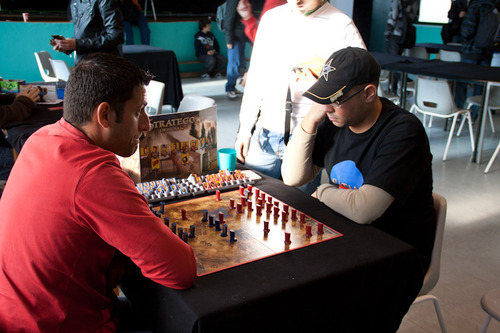|
Sirius (game)
''Sirius'', or ''Galax'', is an abstract strategy game designed by Martial Tramond and published by Bütehorn Spiele in 1976. Players move pieces of three different types, capturing their opponent's according to a hierarchy similar to rock paper scissors until all on one side are eliminated. Gameplay Each player places their thirty game pieces–10 suns, 10 moons, 10 stars–in any order on the first three rows of a 10×10 board. On their turn, a player moves one piece in any direction onto a space that is either empty or has an opponent's piece that can be taken according to a circular hierarchy: sun takes moon, moon takes star, and star takes sun. If a piece is taken, it is removed from the game and the capturing piece moves onto its square. Pieces that make it to the opposing end of the board become "Champions", which can move two squares on their turn and can take opposing pieces of any type. The winner is the player who captures all their opponent's pieces. Reception '' J ... [...More Info...] [...Related Items...] OR: [Wikipedia] [Google] [Baidu] |
Hexagames
Hexagames was a German game publisher in Dreieich, which existed from 1982 to 1992. It was one of the most famous German game publishers of the 1980s, notable for publishing games such as '' Lines of Action'' (1988) and ''Cosmic Encounter'' (1992). History ''Hexagames'' was created by Langden Hensley, with the trademark being registered by the German Patent and Trademark Office in late 1982. In 1982, he and Jürgen Hagedorn released the game '' Long Short'', developed by Hensley. After the game publisher Bütehorn went bankrupt around 1982, Hexagames included several of their games in its program. Hagedorn retired from Hexagames in 1988. Joe Nikisch, the founder of the board game company , was responsible for the product range of Hexagames as product manager beginning in 1986. After the dissolution of Hexagames in 1992, the Berlin games manufacturer Sala took over some of the games under the ''Salagames'' label''.'' Salagames also disappeared from the market after about two y ... [...More Info...] [...Related Items...] OR: [Wikipedia] [Google] [Baidu] |
Abstract Strategy Game
An abstract strategy game is a type of strategy game that has minimal or no narrative theme, an outcome determined only by player choice (with minimal or no randomness), and in which each player has perfect information about the game. For example, Go is a pure abstract strategy game since it fulfills all three criteria; chess and related games are nearly so but feature a recognizable theme of ancient warfare; and Stratego is borderline since it is deterministic, loosely based on 19th-century Napoleonic warfare, and features concealed information. Definition Combinatorial games have no randomizers such as dice, no simultaneous movement, nor hidden information. Some games that do have these elements are sometimes classified as abstract strategy games. (Games such as '' Continuo'', Octiles, '' Can't Stop'', and Sequence, could be considered abstract strategy games, despite having a luck or bluffing element.) A smaller category of abstract strategy games manages to incorporate hidde ... [...More Info...] [...Related Items...] OR: [Wikipedia] [Google] [Baidu] |
Rock Paper Scissors
Rock, Paper, Scissors (also known by #Names, several other names and word orders) is an Intransitive game, intransitive hand game, usually played between two people, in which each player simultaneously forms one of three shapes with an outstretched hand. These shapes are "rock" (a closed fist: ✊), "paper" (a flat hand: ✋), and "scissors" (a fist with the index finger and middle finger extended, forming a V: ✌). The earliest form of "rock paper scissors"-style game originated in China and was subsequently imported into Japan, where it reached its modern standardized form, before being spread throughout the world in the early 20th century. A simultaneous game, simultaneous, zero-sum game, it has three possible outcomes: a draw, a win, or a loss. A player who decides to play rock will beat another player who chooses scissors ("rock crushes scissors" or "breaks scissors" or sometimes "blunts scissors"), but will lose to one who has played paper ("paper covers rock"); a play of ... [...More Info...] [...Related Items...] OR: [Wikipedia] [Google] [Baidu] |
Groupe Flammarion
Groupe Flammarion () is a French publishing group, comprising many units, including its namesake, founded in 1876 by Ernest Flammarion, as well as units in distribution, sales, printing and bookshops ( La Hune and Flammarion Center). Flammarion became part of the Italian media conglomerate RCS MediaGroup in 2000. Éditions Gallimard acquired Flammarion from RCS MediaGroup in 2012. Subsidiaries include Casterman. Its headquarters in Paris are in the building that was the former Café Voltaire (named in honour of the writer and philosopher Voltaire), located on the Place de l'Odeon in the current 6th arrondissement of Paris. Flammarion is a subsidiary of Groupe Madrigall, the third largest French publishing group. History Ernest Flammarion successfully launched his family publishing venture in 1875 with the ''Treaty of Popular Astronomy'' of his brother, the astronomer Camille Flammarion. The firm published Émile Zola, Maupassant, and Jules Renard, as well as Hector Malot, ... [...More Info...] [...Related Items...] OR: [Wikipedia] [Google] [Baidu] |
Internet Archive
The Internet Archive is an American 501(c)(3) organization, non-profit organization founded in 1996 by Brewster Kahle that runs a digital library website, archive.org. It provides free access to collections of digitized media including websites, Application software, software applications, music, audiovisual, and print materials. The Archive also advocates a Information wants to be free, free and open Internet. Its mission is committing to provide "universal access to all knowledge". The Internet Archive allows the public to upload and download digital material to its data cluster, but the bulk of its data is collected automatically by its web crawlers, which work to preserve as much of the public web as possible. Its web archiving, web archive, the Wayback Machine, contains hundreds of billions of web captures. The Archive also oversees numerous Internet Archive#Book collections, book digitization projects, collectively one of the world's largest book digitization efforts. ... [...More Info...] [...Related Items...] OR: [Wikipedia] [Google] [Baidu] |
Science & Vie
''Science & Vie'' (; ''Science and Life'') is a monthly science magazine published in France. Its headquarters is in Paris. History and profile The magazine was started in 1913 with the name ''La Science et la Vie''. In 1982, a spinoff computer magazine, ' (''SVM'') was launched. The first magazine was published at the end of 1983 and was such a success that the number of copies were insufficient on the market. Another spinoff for teenagers, ''Science & Vie Junior'' was started in 1986. It was first published by until the latter was bought by Emap Plc in 2003. In June 2006 the magazine became part of Mondadori France. In July 2019, the magazine was sold to Reworld Media. ''Science & Vie'' was divided in three sections, ''Science'' (Sciences), ''Technologie'' (Technology), ''Vie Pratique'' (Daily life). While the ''Science'' section reported on recent scientific progress, the ''Technology'' section would report on recent technical advances. ''Science & Vie'' covered technical ad ... [...More Info...] [...Related Items...] OR: [Wikipedia] [Google] [Baidu] |
Games & Puzzles
''Games & Puzzles'' was a magazine about games and puzzles. Publication history The magazine was first published in May 1972 by Edu-Games (UK) Ltd. The first editor was Graeme Levin who recruited a variety of games and puzzles experts as writers and consultant editors including Darryl Francis, David Parlett, David Pritchard, Don Turnbull, Eric Solomon, Gyles Brandreth, Nick Palmer, R. C. Bell, Richard Sharp, Sid Sackson and Tony Buzan. Its headquarters was in London. The magazine ceased publication in 1981 but was relaunched in 1994, and then stopped again in 1996. During its last period, between 1994 and 1996, the publisher was Games & Puzzles Publications. Reception Recruiting experts gave it a good reputation; for example, ''Popular Computing'' wrote "Quite simply, ''Games & Puzzles Magazine'' is unique. There is no other publication quite like it anywhere in the world." In Issue 10 of the British wargaming zine A zine ( ; short for ''magazine'' or ''fanzine'') is, ... [...More Info...] [...Related Items...] OR: [Wikipedia] [Google] [Baidu] |
Abstract Strategy Games
Abstract may refer to: *"Abstract", a 2017 episode of the animated television series ''Adventure Time (season 9)#ep262, Adventure Time'' * Abstract (album), ''Abstract'' (album), 1962 album by Joe Harriott * Abstract algebra, sets with specific operations acting on their elements * Abstract of title, a summary of the documents affecting the title to a parcel of land * Abstract (law), a summary of a legal document * Abstract (summary), in academic publishing * Abstract art, artistic works that do not attempt to represent reality or concrete subjects * ''Abstract: The Art of Design'', 2017 Netflix documentary series * Abstract music, music that is non-representational * Abstract object in philosophy * Abstract structure in mathematics * Abstract type in computer science * The property of an abstraction * Q-Tip (musician), also known as "The Abstract" * Abstract and concrete * Hydrogen atom abstraction, in chemistry See also * Abstraction (other) {{Disambiguation ... [...More Info...] [...Related Items...] OR: [Wikipedia] [Google] [Baidu] |

